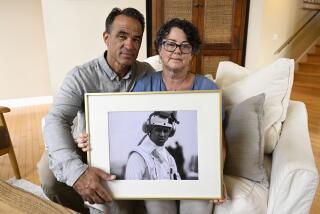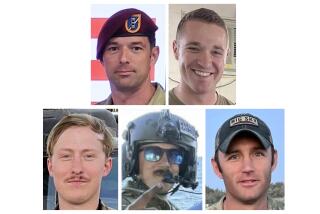Ernie Brace dies at 83; civilian pilot held 7 years by N. Vietnamese
Pilot Ernie Brace, who was a prisoner in Laos and North Vietnam for seven years — longer than any other American civilian during the Vietnam War — was held mostly in solitary confinement, sometimes in stocks or chains.
But in a prison near Hanoi, he and a U.S. Navy pilot in the next cell were able to communicate by tapping on the wall and pressing tin cups against it to talk. For more than a year, the two men bolstered each others’ spirits, shared stories and even acted out favorite movie scenes to provide each other company.
During all this time, they never saw each other. Years passed before Brace got to meet, face-to-face, the man in the next cell. It was John McCain.
Brace, 83, died Friday in a hospital in Klamath Falls, Ore. The cause of death was a pulmonary embolism, said his wife, Nancy Brace.
On Monday, Sen. McCain issued a statement. “Ernie endured more cruelty and severe torture than any other captive during the Vietnam War,” he said.
“We developed a special bond that strengthened us both at a difficult time, helping us to survive together.”
Upon returning home, Brace, who had been severely beaten, was awarded the Prisoner of War and Purple Heart medals. He was hailed as a hero, not only by McCain, but also high-ranking military officers for his conduct while imprisoned.
It was a stunning turnaround for Brace. Only four years before his capture, he seemed destined to live his life under the shadow of a highly publicized dishonorable discharge from the Marine Corps.
Ernest Cary Brace was born in Detroit on Aug. 15, 1931. He quit high school before graduating. “He ran away to join the Marines,” Nancy Brace said.
He was commissioned as an officer and flew numerous Korean War missions, earning the Distinguished Flying Cross.
Back home after the war, things were not going well — his marriage was faltering and he was in debt. In 1961, he was on a routine solo flight over Maryland when the propeller faltered. Unable to land, he bailed out and the plane crashed into a field.
“The notion came to me suddenly that I could walk off from here, and people would think I was dead,” he said in his 1988 memoir, “A Code to Keep.” He ditched his parachute and hid from authorities.
But the mystery of the missing pilot made news and after a few days, Brace turned himself in. After 16 years in the Marines, he was dishonorably discharged.
He took a job as a pilot for a company that flew U.S.-sponsored flights from Thailand to Laos, covertly dropping off personnel, ammunition and supplies.
On May 21 1965, upon landing near a Laotian village, his plane was shot up by North Vietnamese forces that had moved into the area. Brace was taken prisoner and set out on a forced march for several weeks to a jungle camp in North Vietnam. There, he was placed in a bamboo cage so confining that he couldn’t fully stand up. At night he was tied down, with a rope around his neck, and left at the mercy of rats and other vermin.
That cage and a similar one were his homes for more than three years.
He was transferred to the Plantation prison near Hanoi, where on his first night he heard tapping on the wall. Hesitantly, he answered, and eventually realized the prisoner in the next cell was tapping out letters of the alphabet in sequence. Instructed to put his ear to the wall, the prisoner told him, “My name is John McCain. I’ve been a prisoner over a year.”
McCain taught him the tapping code and how to use a tin cup for voice communication. “The wall was like a confessional booth,” Brace said. “Both of us found ourselves telling each other things we would never say to anyone else.”
At one point, Brace was offered release if he apologized for his “crimes.” He refused.
Release finally came March 28, 1973. Brace emerged to the news that his wife had remarried. He spent several months recovering at the Naval Medical Center in San Diego, where he met Nancy, who was a nurse there. They married in 1974 and he went on to work in management for several aviation companies.
Although he was treated as a hero upon his release, Brace was haunted by his separation from the Marines. That was resolved when President Ford granted him a full pardon and his discharge was revised to honorable.
“It was quietly done, unlike my ouster from the Marines,” Brace wrote. “But for me, the return of my self-respect was a triumph.”
In addition to his wife, Brace is survived by sons Michael, Ernest, Patrick and Cary; and a sister, Rose Bradford.
Twitter @davidcolkerhttp
More to Read
Start your day right
Sign up for Essential California for the L.A. Times biggest news, features and recommendations in your inbox six days a week.
You may occasionally receive promotional content from the Los Angeles Times.







